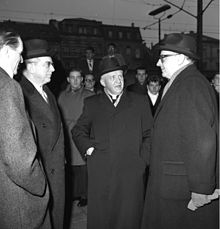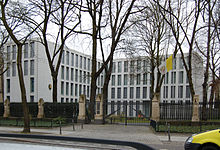- Apostolic Nuncio to Germany
-
The Apostolic Nunciature to Germany is an ecclesiastical office of the Roman Catholic Church in Germany. It is a diplomatic post of the Holy See, whose representative is called the Apostolic Nuncio to Germany with the rank of an ambassador. The office of the nunciature has been located in Berlin since 1925, in personal union with the new Apostolic Nuncio to Prussia until 1934. Between 1920 and 1925 the nunciature was held in personal union by the Apostolic Nuncio to Bavaria, seated in Munich. With the unconditional surrender of Germany in 1945 the diplomatic ties were interrupted and reestablished for West Germany only in 1951, then in Bonn. In 2001 the nunciature moved again to Berlin.
The three Popes, once serving as nuncios in what is today's Germany, were Alexander VII, Leo XII and Pius XII. The current Apostolic Nuncio to Germany is His Excellency Jean-Claude Périsset, who was appointed by Pope Benedict XVI on October 15, 2007.
Contents
List of Apostolic Nuncios to Germany
To the Holy Roman Empire
 Lorenzo Campeggio, the first nuncio in the territory of modern-day Germany
Lorenzo Campeggio, the first nuncio in the territory of modern-day Germany
The first nuncio in the territory of modern-day Germany was Lorenzo Campeggio in 1511, as the nuncio and cardinal protector to the Imperial Court.[1] His role was ratified in 1513 by Leo X, the new pope.[1] The nunciature became permanently accredited in 1530, whereafter the nuncios often followed Charles V, Holy Roman Emperor even when he left Imperial territory.[1]
- Lorenzo Campeggio (1511–1539)[1]
- Karl von Miltitz, Nuncio to Saxony in 1518, envoy to prompt Luther's revocation of his theses, and Saxony to give up protecting Luther
In Cologne
Main article: Apostolic Nuncio to CologneThe Cologne nunciature was erected in 1584 for the northwest of the Holy Roman Empire and the Rhineland.[1] The Nuncios to Cologne were accredited to the Achbishop-Electorates of Cologne, Mainz and Trier. In 1596, the Low Countries (Netherlands) were detached from the nunciature of Cologne, receiving their own nuncio in Brussels.[1]
- Giovanni Francesco Bonomi (= Bonhomini; 1584–1587), Bishop of Vercelli
- Ottavio Mirto Frangipani (1587–1596), Bishop of Cajazzo, 1592 Bishop of Tricarico
- Cesare Speciano (1592/96–1598)
- Coriolano Garzadoro (1593/98–1606), Bishop of Ossero
- Attilio Amalteo (1606–1610)
- Pier Luigi Carafa (1624–1634)
- Ciriaco Rocci (1630–1634)
- Fabio Chigi, future Pope Alexander VII (1639–1651)
- Francesco Buonvisi (1670–1672)
- Opizio Pallavicini (1672–1680)
- Sebastiano Tanara (1687–1690)
- Gianantonio Davia (1690–1696)
- Fabrizio Paolucci (1696–1700)
- Giulio Piazza (1702–1706)
- Giovanni Caprara Montecuccoli (1766–1775)
- Carlo Bellisomi (1775–1785)
- Bartolomeo Pacca (1786–1794)
- Annibale della Genga, last nuncio to Cologne and future Pope Leo XII (1794–1804)
- Became the Apostolic Nunciature to Austria
In Munich
Main article: Apostolic Nuncio to BavariaIn Berlin
Germany and the Holy See concluded diplomatic ties on 1 May 1920.[2] Abp Eugenio Pacelli, Nuncio to Bavaria, was appointed in personal union "Nuncio to Germany". As with Bavaria, diplomatic relations were also established with the most important state of Germany, Prussia, in 1925, on which occasion Pacelli gave up the Bavarian nunciature and was appointed Nuncio to Prussia in personal union with the nunciature to Germany, and moved to Berlin the same year. Until the dissolution of the German federal states in May 1934, Pacelli remained also Nuncio to Prussia by a separate title. The relations with Bavaria remained fully intact with Pacelli's successor Nuncio Abp Alberto Vassallo-Torregrossa, whose ambassadorial rank fell also away in 1934 together with the existence of Bavaria as an entity of statehood; he was however able to more or less continue affairs until he left the country in 1936 at the insistence of the Nazi regime.
- 1920–1930: Eugenio Pacelli (future Pope Pius XII), nuncio to Germany, in personal union nuncio to Bavaria (1917–1925) and nuncio to Prussia (1925–1930)
- 1930–1945: Cesare Orsenigo, in personal union nuncio to Prussia (1930–1934), since 1944 in Prötzel, and January 1945 in Eichstätt, where he died in 1946
- 1945–1951: vacancy, no nuncio to Allied-occupied Germany
- 1946–1951: Aloisius Joseph Muench as apostolic visitor, in personal union military vicar delegate of the United States armed forces, becoming nuncio in Bonn in 1951.
In Bonn for the Federal Republic of Germany only
With West Germany, officially the Federal Republic of Germany, gaining quasi-sovereignty in 1951, the ties with the Holy See are upgraded again to nunciature level. The East German Democratic Republic had not diplomatic ties with the Vatican.
- 1951–1959: Aloisius Joseph Muench
- 1960–1975: Corrado Bafile
- 1975–1984: Guido Del Mestri
- 1984–1991: Giuseppe Uhac, since 1990 also competent for the New states of Germany
- 1991–1995: Lajos Kada
- 1995–2003: Giovanni Lajolo, until 2001 in Bonn
In Berlin since 2001
- 1995–2003: Giovanni Lajolo, moved to Berlin in 2001, as did the Federal Government
- 2003–2007: Erwin Ender
- 2007–present: Jean-Claude Périsset
Notes
External links
- Official site
- Nunciature to Germany page at catholic-hierarchy.org
- Apostolic Nunciature of Germany page at gcatholic.com
Bilateral relations Albania · Algeria · Argentina · Canada · People's Republic of China · Republic of China (Taiwan) · European Union · France · Greece · India · Indonesia · Iran · Iraq · Ireland · Israel · Italy · Jordan · Lebanon · Macedonia · Malaysia · Malta · Mexico · Nepal · New Zealand · Pakistan · Palestine · Poland · Peru · Romania · Russia · Rwanda · Saudi Arabia · Spain · Sudan · Syria · Turkey · Ukraine · United Arab Emirates · United Kingdom · United States · Venezuela · Vietnam
Related topics Secretariat of State · Cardinal Secretary of State · Secretary for Relations with States · Foreign relations of the Holy See · Legal status of the Holy See · Activities of the Holy See within the United Nations system · Multilateral foreign policy of the Holy See · Diplomatic missions of / to the Holy See · Nuncio to the UN / in Geneva · List of heads of the diplomatic missions of the Holy See · ConcordatsCategories:- Apostolic nuncios
- Diplomatic missions of the Holy See
- Roman Catholic Church in Germany
- Ambassadors to Germany
- Diplomatic missions in Berlin
- Lorenzo Campeggio (1511–1539)[1]
Wikimedia Foundation. 2010.




